A Tremendously Disappointing Re-Read: The Soaked-in Misogyny of Piers Anthony’s Xanth
When my life is super-busy, I tend to reread books that won’t invite my brain to start analyzing to see what I could learn. I reread Edgar Rice Burroughs’ biography, and recently, I thought I’d reread Piers Anthony’s Xanth series.
I first read the first novel, A Spell for Chameleon, in grade six and reread it maybe later in my teens. I remember it being charming and punny, but my memories were pretty dim. I was also wondering if I could recommend it to my 11-year old son after he finished with the Percy Jackson opus.
A Spell for Chameleon is about Bink, a person who lives in the North Village of the land of Xanth, where every plant and animal is magical and every person has a single magical talent, everyone except for Bink. If he doesn’t find out his magical talent, he’ll get kicked out of Xanth upon turning 25.
This main plot line is fun. It turns out that Bink’s talent is actually among the most powerful in the land: protection against all forms of magic. But his power has to keep itself secret, otherwise it could be foiled by anyone with a non-magical bow and arrow.
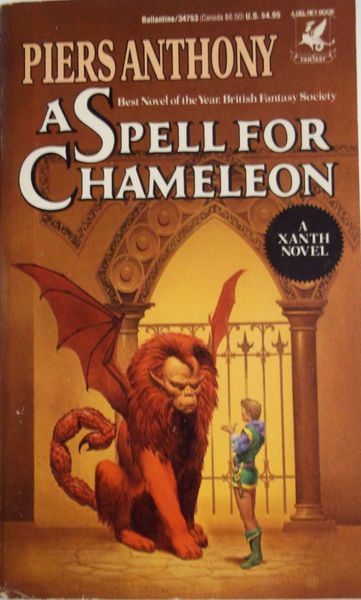 |
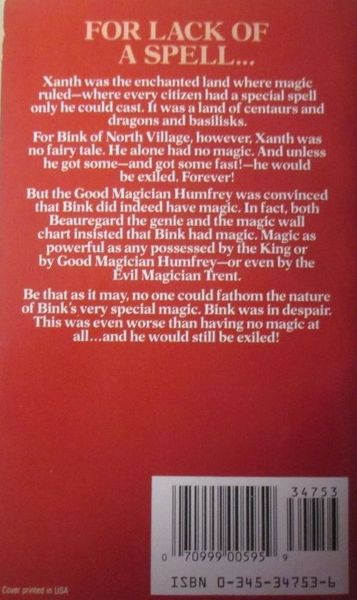 |
The operation of Bink’s talent is very reminiscent of the way Teela Brown’s luck works in Niven’s Ringworld. Depending on how far back you look, even the very inciting incidents of the book can be seen to be driven by Bink’s talent, much in the same way Teela’s luck seems to have caused the whole journey to the Ringworld.
All good, right?
Nope. Returning to this book (and a couple of the sequels) as a mature adult makes me embarrassed that I was not offended at its soaked-in misogyny earlier in life. It’s another piece of evidence that I really didn’t grow into a feminist until I got to university.
How bad is the sexism and misogyny? I mean, can we cut it some slack because it was published in 1977?
Um. No. The 1970s were the 1970s, but there were still lots of remarkable writers creating compelling stories with well-rounded characters back then.
All the female characters in the first two novels occupy a narrow range of man-created stereotyped roles that were already fossils in the 1970s. Anthony has:
- the dumb love interest,
- the smart love interest,
- the nagging love interest, and
- the cautionary tales for Bink’s choice of love interest.
The only female character who seems to exist independently of Bink’s love interest is Cherie, a centaur, who is sexualized anyway, and he ends up copping a feel by accident, because… well, no, that’s just gratuitous. But as soon as Cherie’s mate arrives, Cherie ceases to be a meaningful character and becomes a nagging cautionary tale for Bink.
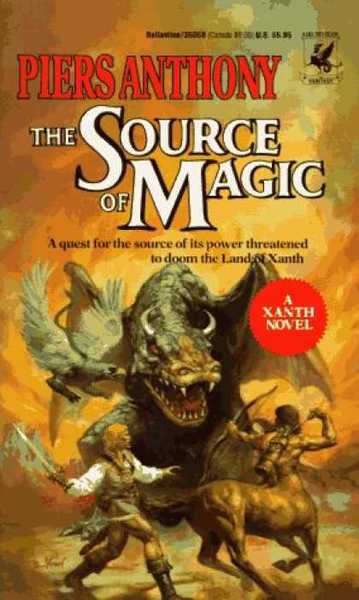 |
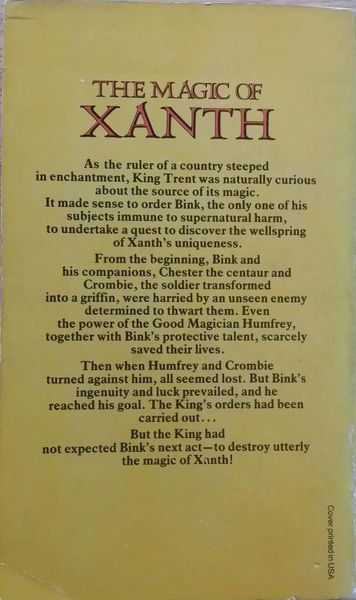 |
I thought I’d understood the concept of male gaze before. Reading A Spell for Chameleon is like wearing male gaze goggles. Bink’s internal monologue and the authorial narration are fixated on noticing every woman’s looks and personality, and assessing them. The judging takes the form of “Is she good for me?” “Is she right for me?”
The character and authorial value judgments have the depth someone would use to buy a car, like “But if I get the hatchback, it’s not as cool, and then I can’t have a spoiler,” or “Boy, the rims on that one sure are appealingly flashy.”
All women throw themselves at Bink, or are just waiting for the word. The evil sorceress, that beautiful dumb blonde who has to be told to leave her clothes on, the nymphs (who are explicitly men’s fantasies without brains), the lady ghosts, etc.
There is little authorial consideration of whether or why any of them would want him. There’s no hint of a meaningful connection, and this thread of the novel is largely romantic interest bereft of chemistry.
In dialogue and in the authorial narrative, women are given generalized characteristics the way Archie Bunker would assert them, down to evil, including a woman-hating character (who in Book II gets his reward by marrying a nymph). Women are good for this. Wives are good for that. One must always do this with a wife. One must always guard against women on this count. Etc.
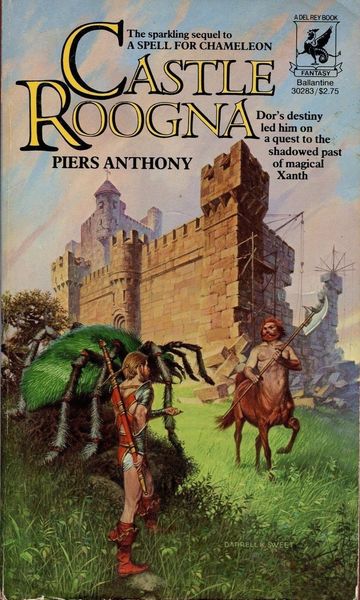 |
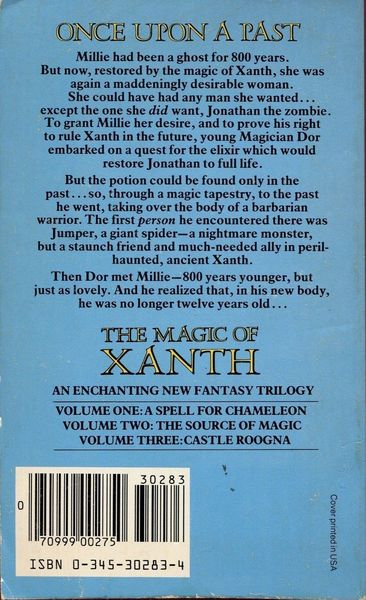 |
I dog-eared my copies to keep track of some exemplary lines:
“But you can have anything you want — anything at all.” She took a deep breath… And it occurred to Bink that was was not restricting it to food. No doubt she got pretty lonely here on her island, and welcomed company. The local farmers probably shunned her — their wives would see to that!
“We’re not interested in your females.”
“Not their minds anyway.”It was said that the only thing a troll was afraid of was his wife…”
“We are, after all, only females.” [said the female troll]
“You are true males, always ready for a challenge.”
“Uh, girls, I’m a married man.”
“She will never know,” a buxom lass informed him. “We need you more than she does.”“As all females always fail…”
Now he was using these females in the manner a soldier understood: as fodder for a battle. They might not have responded to a “nicer” man. Maybe they needed one who held them in contempt, who was willing to brutalize them for a purpose.
Chester was standing beside him, probably thinking of horsing around with Cherie Centaur, who was indeed a fetching filly.
I was a bit baffled by this re-reading experience, and I don’t normally do negative reviews. I can take comfort that this post won’t do anything to Anthony’s sales (by 1985 the second book in the series, A The Source of Magic, was up to 22 printings).
But I can’t show this book to my son. I couldn’t show it to my mother. I would not recommend it to a female reader, or, well… anyone. So instead of donating it to a thrift shop (as I normally do with my downsizing book collection), I’m going to recycle my copies.
Derek Künsken writes science fiction and fantasy in Gatineau, Québec. He normally is not so opinionated, but can now state unequivocally that he has two pet peeves: anti-vaxxers and misogyny. He tweets from @derekkunsken.
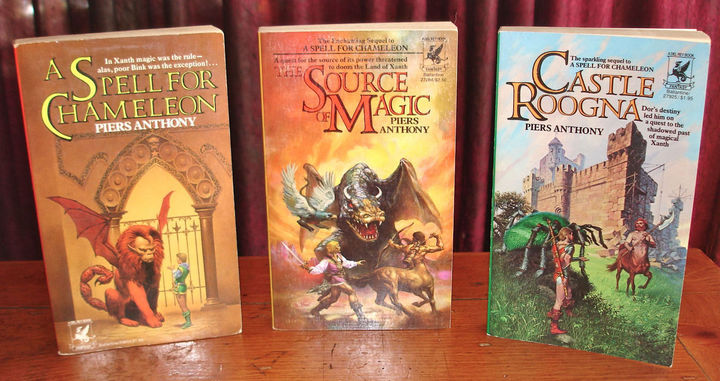
So, Xanth was Misogynistic…?
Sweet Jeebuz, and I missed it, I think because I was into a “Scifi” prefernce phase and the “World where everyone has a magic spell” was a bit too “High Fantasy” for me then…
Mind you the other day I was remembering being a young lad in K-mart as I came for memories with the store closing and I remembered all the Gor books of my youth I found on the shelves there back then though I had to dig coz some Church Lady type who worked there used a silver paint pen marker to cover up the Boris painted boobies. Ah, Gor… Well, had to have something when I’d already exhausted REH.
But then Xanth was “misogynist!?”
I almost hit Amazon or Kindle to buy it up just on seeing your title…! But I at least read further. Thanks for this review. There was another review on Xanth and misogyny, but that reviewer was far more ‘out there’ than you so I didn’t take it seriously. Don’t per se agree with you I think, but sensible writing.
No offense, but what would not get a “This is Sexist!!!” review by your standards? Based on your review I think anything that didn’t have the protagonist be an ugly muscular woman who smashed men to the ground, yelled at them for how bad men were and they whimpered “Thank you…” as she ground her metal armor high heel into their temple would get a glaring “This is misogynistic!” type review… No, that’s more for the other reviewer of Xanth here, about a year back during a big, foaming “Puppy” issue that overshadowed the article. From your more sensible review it sounds like Xanth’s only sin was being A – mainstream for the times -and/or- B – not part of that MZB/Sword and Sorceress P.C. movement that ruined the paperback industry well before e-text was remotely feasable, one man’s opinion.
If I’d read it as a young lad in the 80s I’d have not really noticed anything then… Was still in the ‘wonder’ stage where the surface of the entertainment was #1 so it would have been the story then the world’s concepts.
Think I would have liked the nymphs, though, so might check it out someday;-) Though for that kind of titillation the weirdo Hentai “Monstreu” (monster girl) comics you can find translated into English are better;-)
“has two pet peeves: anti-vaxxers and misogyny.” I find that amusing since I feel the Vaccine industry is inherently Misogynist.
I’m constantly looking for old books that are pleasantly surprising in their handling of gender roles. I now know not to waste time with this series.
GreenGestalt sounds like a generic MRA loser, I’d just ignore him.
While I can get annoyed at people who wax too wroth about outdated cultural mores, I noticed the misogyny of this, and the bad writing, when I was a teenager in the 70s. Nobody is expecting Anthony to write like Russ or Sheldon, but his female characters are considerably less nuanced and interesting than those of Robert E. Howard or Ian Fleming, to name two less-than-progressive examples (of course, they wrote much better prose, too).
Hey GreenGestalt! There are tons of great worworks out there. Katherine Kurtz had powerful characters who were complex, well-rpunded and we each the protagonists and centets of their own lives. As I said, I’m don’t often get negative about things I red, but this one warranted it. I read the review you may be talking about. It was longer, but not necessarily inaccurate. In mine I forgot to mention the entirely gratuitous rape trial chapter because it was so unrelated to anything else going on in terms of character or plot. I’ve never read the Gor books. I’m pretty sure they wouldn’t be my thing based ob what I’ve heard.
Hey Mithrandir – my pro-vaxxing comes honestly – I did my masters research in an immunology lab building genetically-engineered viruses 🙂
Hey Ian. For some reason Conan never called to me. A neighbour read the Marvel B&W magazine-sized issues, but i’ve always gravitated to more cebebral, or at least well mannered pulpy heroes (Flash Gordon, John Carter, Tarzan, Carson of Venus, etc).
Derek
A “Generic MRA Loser” – wonder if that counts as a personal attack here…?
My humor obviously went above you, or beneath. Simply put I was expressing shock that there could be such issue with Xanth when it seemed to have a few mild “Tropes” that would be just window dressing for High Fantasy at the time in the mainstream, clearly, though also I haven’t read it and don’t think I will soon.
My motivation is growing up reading from the library or used bookstores so I skipped the cliff publishing went off in the 80s and then started buying “New” works in the 90s. I saw the great stories of old replaced by crude, P.C. Pandering. It was awful, not so much defending old sexist male tropes, it was just plain awful…
Someone bought me a set of these from the SF Book Club. I’m afraid I read the first couple as ironic, or at least comedies, until I read the afterwords, which purported to be “how I wrote this” memoirs. There I found out just how big a misogynist A-hole Piers Anthony was. There are a few other groups in society who could pick a bone with him as well, if I remember correctly.
“A Tremedously Disappointing Review: The Soaked-In PC Virtue Signalling and Pearl-Clutching of Derek”
The Xanth books are mildly entertaining books of little note. Please calm down.
[…] other day I stumbled upon a post at Black Gate wherein the writer lamented his failings as a compassionate human being. You see, he decided to […]
Announcement that The Ghost in the Shell guy wants to make a Xanth movie and a television series.
Bob: Hahaha. Nothing can go wrong there! lol
I’m currently on a reread of Spell and came across your review. I also am surprised at how simple, let’s say, Bink’s view of woman is.
And like you, I write and illustrate fantasy, and yes, live in Gatineau. ( Secteur mont bleu, mon voisin!)
[…] majority of his stories being his own thinly-veiled sex and power fantasies. The same is true for Piers Anthony, except with a lot more sexism and misogyny. Orson Scott Card is a notorious homophobe and racist. […]